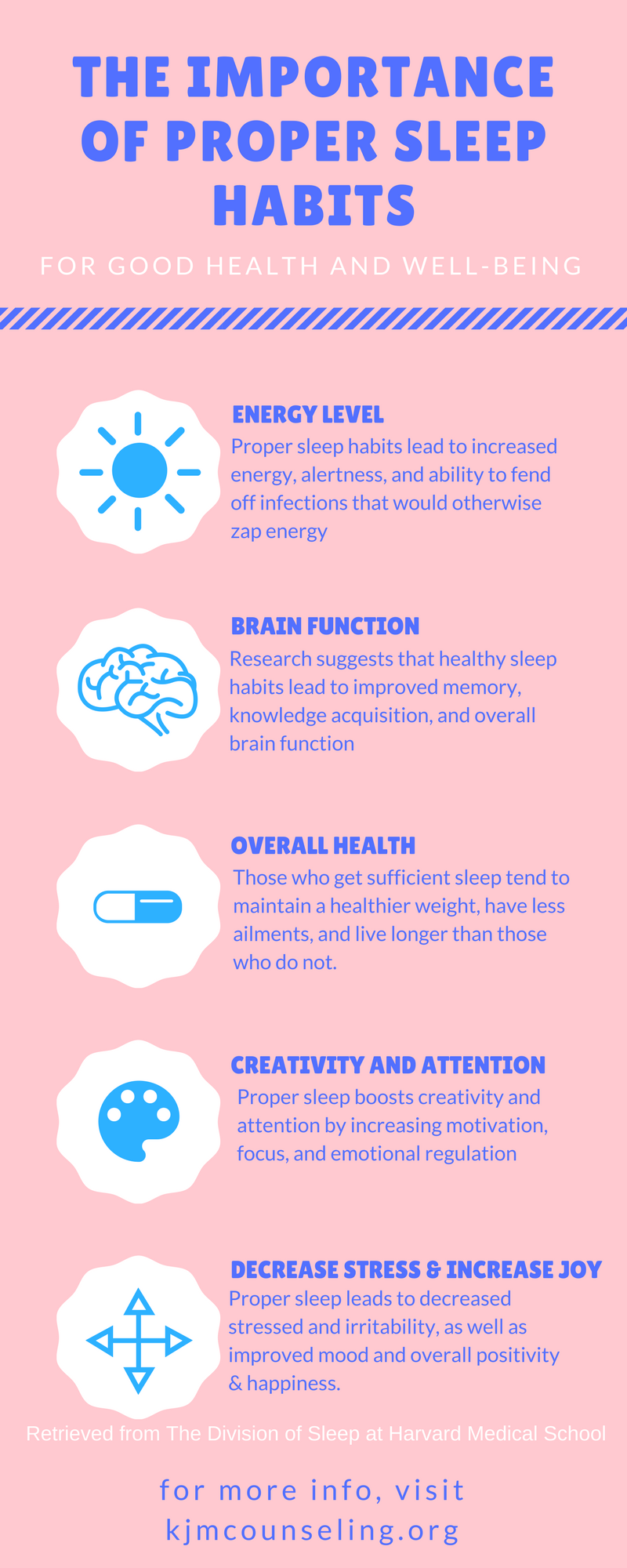GET SOME R&R: The Importance of Proper Sleep Habits
As children, we avoided it.
As young adults, we challenged ourselves to go without it.
As adults, we crave it.
Sleep.
Good old-fashioned sleep.
I'm not talking about the occasional cat nap. Or the laying in bed with mind racing and thumbs twiddling kind of sleep.
I'm talking full-on, 100%, waking up with lines on your face and drool on your pillow, bright-eyed & bushy-tailed, 8 hours of complete and utter perfect sleep.
Let's face it. We all lead hectic lives. We try to juggle ten thousand things at once and are always thinking about our "to-do" list, maintaining our sanity in the chaos, and forging forward in the best way possible. We have many things that keep us up at night. As much as we crave sleep, we have difficulty maintaining proper and balanced sleep habits. Unfortunately, the problems that lack of proper sleep could cause run far deeper than just craving a few extra hours or groggily smacking the snooze button. But, rather than looking at the disadvantages caused by improper sleep, how about we take a look at the positive benefits that healthy sleep habits can lead to?
Benefits of Proper Sleep Habits
Routinely catching good zzz's is just all-around fabulous! In fact, maintaining proper sleep habits can lead to a number of mental, physical, and emotional benefits...
According to the Division of Sleep at Harvard Medical School, maintaining proper sleep leads to improved memory and knowledge acquisition. Our ability to store and maintain new information, and to form and store new memories, is significantly improved when we maintain proper sleep habits. Healthline expands on this by sharing research that suggests proper sleep habits can sharpen focus, attention, and can boost motivation and creativity! It's tough enough to maintain focus and attention in a humdrum lecture or endless work meeting, and honestly, who doesn't love channeling their inner genius via a spark of creativity?
In short, sleep is imperative for optimal learning and brain function.
Studies also suggest that a routinely enjoying a good night's rest can improve overall mood, emotional regulation, and can help us to maintain a positive outlook. All of which are totally necessary in keeping the joy and light-heartedness in life!
Moreover, good sleep leads to better overall health. Researchers agree that physical health is improved with quality zzz's, and right amount of them. Those who maintain proper sleep habits tend to have a greater ability to fend off infection and illness, have increased energy to boost exercise and movement, and have lowered risk of heart-disease than their sleep-deprived counterparts. Additionally, sleep, metabolism, and appetite go hand-in-hand. Those who maintain healthy sleep habits also have a better chance of maintaining healthy weight.
Finally, good sleep leads to more happiness! Those who get the right amount of quality sleep tend to have lower levels of stress and an increased positive mood!
How Much Sleep Do We Need?
According the National Sleep Foundation and Healthline, a good solid 7-9 hours of sleep each night is most beneficial for those ages 18-64. Additional determinants of how much sleep you may need depend on factors such as genetics and quality of sleep (frequency of mid-sleep wake ups, amount of time it takes to fall asleep, etc.). If you wake up feeling more groggy and irritable than rested, or if you have difficulty getting out of bed, these additional factors may impact you.
A Few Tips for Getting Those Crucial ZZZ's
So how do we do it? How do we get the sleep that our bodies and minds so desperately crave?
Start by planning (and committing to) a bedtime routine. Create a plan that you consistently follow in order to prepare your body and mind for sleep. Your plan could include:
1. What you eat and when you eat it.
Aim to eat dinner before 7pm. Try to keep your meal on the lighter side and, if possible, try to include foods that contain both protein and tryptophan (which according to this site, morphs into serotonin in the body and aides in sleep). If you need a little something before bed, aim for foods that include these sleep-aiding superstars, as well. Some ideas include: nuts, melon, whole grains, oatmeal, bananas, and turkey.
2. Avoid caffeine and alcohol.
Do you tend to round your evening off with a nightcap? That late-night glass of wine, dessert coffee or hot toddy, could be keeping you up at night! Instead of that evening cocktail or coffee, aim for a non-caffeinated herbal tea, or a glass of warm milk. Better yet, you could...
3. Avoid drinking liquids past 7pm.
Your bladder will be less inclined to wake you up at 2am if you do.
4. Exercise.
Get out and go for a walk. Do some bedtime sleep-inducing yoga moves or stretches. Moving your body gets rid of the restlessness and prepares it for a good night of rest.
5. Practice mindfulness.
Deep breathe. Visualize calming images. Be in the moment. Prepare your mind for rest.
6. Meet your sensory needs.
Slowly breathe in calming essential oil scents. Take a warm bath. Cover yourself in a weighted blanket. Listen to calming sounds.
7. Do not force sleep.
If you find yourself having trouble sleeping, don't force it. Get up and take a 5 minute break from sleeping. Read a book (NOT on a screen) or walk around your home. Have a light snack of sleep superfoods. Come back after a few minutes and try again.
7. Be consistent.
Be sure to follow your routine every night so that it becomes habit.
For more information on how to develop good sleeping habits or to improve your sleep overall, check out this bedtime blueprint.
Source: Authentic Asheville

